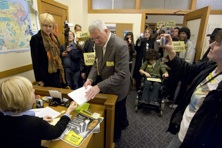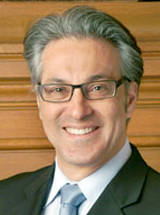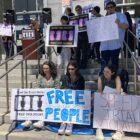 |
| Zane Blaney, executive director of Access SF, lobbying supervisors in March to save public access TV. Photo by Luke Thomas |
The San Francisco Board of Supervisors temporarily rescued public access television from the brink of extinction Tuesday, passing an ordinance that reimposes a city franchise fee on Comcast and other cable operators.
“It was a rescue mission,” said Supervisor Ross Mirkarimi, who spearheaded the ordinance. “This fight will repeat itself in a little less than a year.”
The new 1.15 percent fee takes effect in January. The measure passed, 8-3, with supervisors Sean Elsbernd, Michela Alioto-Pier and Carmen Chu opposed.
The new fees, combined with the 5 percent state cable franchise fee, should raise roughly $1.8 million that can be divvied up among the city’s public, education and government access channels. This is good news for those channels, because all three lost funding after the state Legislature passed the Digital Infrastructure and Video Competition Act in 2006. That move yanked cable franchise fees away from local and city governments, allowing statewide video and cable franchise fees instead.
The result was that cable operators no longer had to pay local public access channels operating expenses. Had the San Francisco ordinance not passed, Access SF, the city’s primary public access station, would have faced a huge budget hole July 1, the start of the new fiscal year. When the franchise change took effect in 2007, the city lost $517,000 that supported Access SF, and the station faced losing about two-thirds of its annual funding.
In a separate deal, Comcast also agreed to supply the city’s Department of Technology with a $375,000, one-time grant to help offset the money San Francisco channels lost for public, education and government channels. Comcast’s grant money should be used to fund the public access channels’ operations.
The new San Francisco fee and Comcast grant award represent a welcome reprieve for public access supporters, who have been lobbying the city for months to save Access SF, which operates Comcast channels 29 and 76, Astound channels 29 and 30 and AT&T’s channel 99.
“This sounded good,” said Chris Ferejohn, program coordinator for Access SF, when Mirkarimi announced the Comcast grant at the May 19 Board of Supervisors meeting. “Ross Mirkarimi has been staunchly on our side. What this will do is enable our station to survive until next year at this time.”
How much of the new money will Access SF get? “We believe that this funding level will adequately address the needs of all the entities involved here and that’s the public channel, the education channel and the government channel,” said Ron Vinson of the Department of Technology.
 |
| Supervisor Ross Mirkarimi, author of an ordinance to temporarily save San Francisco’s public access TV station. |
Even with some grant money supporting public access, Zane Blaney, executive director of Access SF, said that the publicly funded station still faces service cuts, and the elimination of most of its low-cost workshops and production training. And unless laws are changed at the state and federal level, Blaney said, public access stations remain imperiled.
The root of the problem is the Digital Infrastructure and Video Competition Act.
Federal and state telecommunication laws require cable operators to provide capital funds to cities for equipment for public, educational and governmental channels. But under the 2006 state law, cable channels are regulated by the California Public Utilities Commission instead of cities, and are no longer required to fund the stations’ operation.
“We should have never been in this place,” Mirkarimi said at the May 19 supervisors meeting. “Neither of the cable franchise operators had provided us sufficient funding beyond June 30 to keep public access going, and I think this is appropriate triage in order to retain something that is beloved and something that is important to San Francisco.”
California cities did have an escape hatch. State law says that cities can adopt a local franchise fee, taxing cable operators up to 3 percent of their gross revenues. Initially the Board of Supervisors considered writing the maximum 3 percent into the ordinance, but that was lowered to 1.15 percent after Comcast offered the additional grant.
“I didn’t want to be hamstrung by the figures so I opened up a new funding opportunity,” Mirkarimi said of the lower fee. He added that the grant money could be used to fund stations’ operations, whereas the franchise fee could only go to support capital spending.
The new ordinance is good news for Access SF producer Aleada Minton. She said her six-year-old Access SF TV show, “Comedy, Culture, Commentary,” can survive for another year. Minton said that public access channels will keep being funded so SF residents can have their voices heard.
Public access, she said, "adds more checks and balances to the community at large because anyone can get a show as long as they’re a resident of San Francisco.”
Public Press reporter Sam Chapman contributed to this report.










